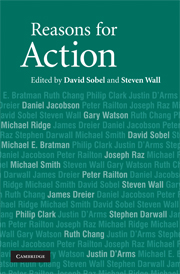Book contents
- Frontmatter
- Contents
- Notes on the contributors
- Acknowledgments
- 1 Introduction
- 2 Intention, belief, and instrumental rationality
- 3 Reasons: practical and adaptive
- 4 The explanatory role of being rational
- 5 Practical competence and fluent agency
- 6 Practical conditionals
- 7 Authority and second-personal reasons for acting
- 8 Promises, reasons, and normative powers
- 9 Regret and irrational action
- 10 Mackie's motivational argument
- 11 The truth in Ecumenical Expressivism
- 12 Voluntarist reasons and the sources of normativity
- Bibliography
- Index
6 - Practical conditionals
Published online by Cambridge University Press: 05 May 2010
- Frontmatter
- Contents
- Notes on the contributors
- Acknowledgments
- 1 Introduction
- 2 Intention, belief, and instrumental rationality
- 3 Reasons: practical and adaptive
- 4 The explanatory role of being rational
- 5 Practical competence and fluent agency
- 6 Practical conditionals
- 7 Authority and second-personal reasons for acting
- 8 Promises, reasons, and normative powers
- 9 Regret and irrational action
- 10 Mackie's motivational argument
- 11 The truth in Ecumenical Expressivism
- 12 Voluntarist reasons and the sources of normativity
- Bibliography
- Index
Summary
INTRODUCTION
Sometimes we are under conditional requirements to do things. We can express them like this:
(1) If p, then R ϕ.
The “R” is for “requirement.” We often say ‘ought’ instead; at least, in this essay, I shall assume that what we say when we say that we ought to do something is the same as saying that we are required to do it. This may be false, but here I will assume it is true. If I'm wrong then what I am saying applies to conditional requirements, but not to conditional oughts.
I am most interested in one particular sort of conditional requirement. It is a form that has as its antecedent a goal-directed intentional state of the agent. Some people think this state is a desire, some think it is an intention, some think it is a preference. (I am in the last camp.) For familiarity and convenience I'll speak of desire, though this may not be the most plausible. The kind of requirement has to do with means-ends rationality. An example:
(2) If you want to lose weight, then you ought to avoid cheeseburgers.
I will call this type of conditional requirement an instrumental requirement. One might adjust this requirement to add to the antecedent that you believe that the only way to lose weight is to avoid cheeseburgers. If you like(!), imagine that this belief is tacitly included.
On one popular account, the instrumental requirement is misleadingly stated.
- Type
- Chapter
- Information
- Reasons for Action , pp. 116 - 133Publisher: Cambridge University PressPrint publication year: 2009
- 8
- Cited by



